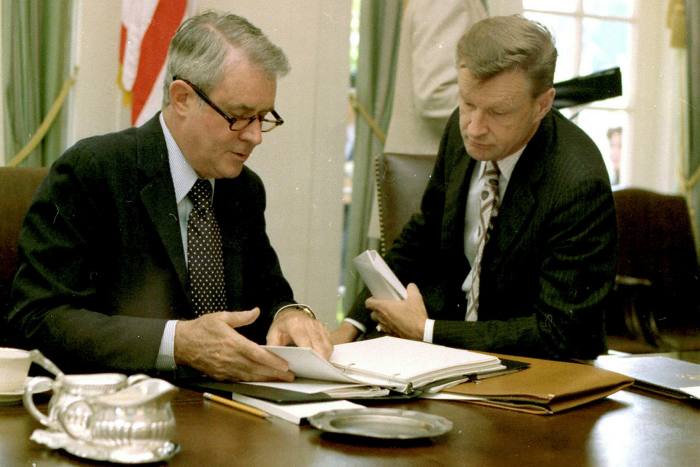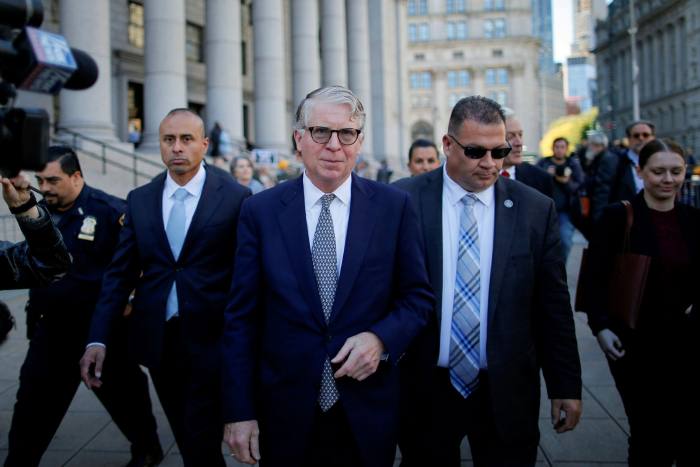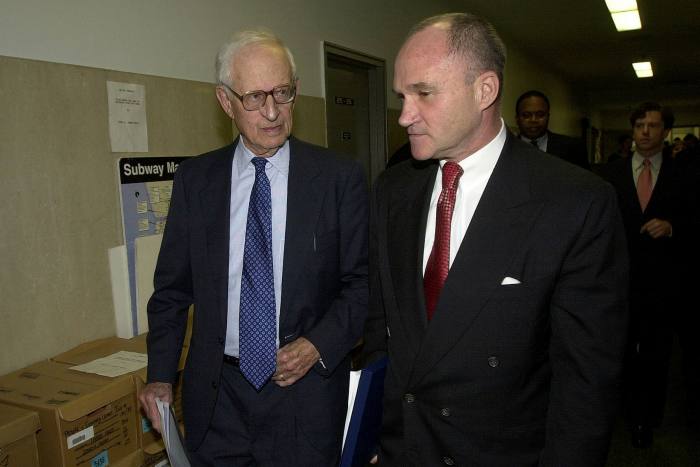Among the many challenges facing Donald Trump in his post-presidential life — from reviving a sputtering business empire to fending off impeachment and restoring lustre to his brand — the most grave may be Cyrus Vance.
Mr Vance, the Manhattan district attorney, is pursuing what is the only known criminal investigation into Mr Trump and The Trump Organization. The probe began in 2018 in response to reports that the president’s former lawyer and fixer, Michael Cohen, had arranged hush money payments for two women who claimed to have had extramarital affairs with Mr Trump. Cohen subsequently pleaded guilty to criminal charges stemming from the pay-offs.
Mr Vance’s investigation has since broadened. According to recent court filings, the DA is now exploring possible banking, tax and insurance-related fraud committed by The Trump Organization. One possibility under examination is whether Mr Trump inflated the value of his properties for some purposes — say, securing a bank loan or insurance — while minimising them when it came to paying taxes. When Cohen testified before Congress in 2019, he accused the president of doing so routinely.
Mr Vance's office recently subpoenaed the towns of Bedford and North Castle in Westchester County for tax assessments and other documents related to an estate known as Seven Springs, which Mr Trump bought in 1995 with the intention of developing.

The Trump Organization declined to comment — although the president has regularly dismissed the legal proceedings against him as a partisan “witch-hunt”.
For Mr Trump and his three adult children, who have held various roles in the family real estate business, the consequences of criminal charges could be dire — especially at a time when The Trump Organization is struggling on multiple fronts.
The financial disclosure forms Mr Trump filed before leaving office showed revenues fell by more than a third last year compared with 2019, as the coronavirus pandemic has devastated luxury retail, hotel and office properties around the world.
At the same time, widespread revulsion at Mr Trump’s role in stoking a failed insurrection at the Capitol on January 6 has prompted many businesses to cut ties with him; including Deutsche Bank, his longtime lender, and the Professional Golf Association, which had been planning to hold its 2022 championship at one of his clubs.
For Mr Vance, filing criminal charges against a former president — something that is unprecedented in American history — is also rife with risk. “If he indicts Donald Trump, he better get him,” says one New York political adviser. For better or worse, it will almost certainly define Mr Vance’s legacy.
“I’m positive whatever decision he makes, there will be people that will publicly disagree with him,” says Daniel R Alonso, a lawyer at Buckley in New York, who once served as Mr Vance’s top deputy.

“Some people will criticise him if he charges Trump — viciously. And other people will criticise him if he doesn’t charge Trump — viciously. That’s just the nature of that job, as we’ve seen over the past 10 years. His job isn’t to please people but to do what he thinks is right.”
Mr Alonso believes that an inconsistency between reported financial figures was “a reason to investigate” but “not a reason to slap cuffs on somebody”.
He, and other former prosecutors who have followed the case from the outside, point to the difficulty of proving criminal tax and accounting charges to a jury — especially with a company as complex as The Trump Organization, which is a labyrinth of private partnerships. There is also the fact that Mr Trump is known not to use email.
“In order to unravel that, it’s going to be very complicated,” says Mr Alonso. “And also very complicated to prove Trump’s intent — though not impossible.”
Others believe such challenges could be overcome if Mr Vance has persuaded an insider — perhaps an executive at The Trump Organization, its lender Deutsche Bank or its accountants Mazars — to serve as a co-operating witness whose testimony might guide a jury through the thicket. They are convinced by the scale and effort of the investigation, which has involved a Supreme Court fight, that Mr Vance intends to act before his third term ends next January. Mr Vance is not expected to seek re-election.

“Here is Cy Vance’s moment,” says Hank Sheinkopf, a New York political strategist who has long known Mr Vance. “His legacy is mixed. This could be his ticket to posterity.”
Edward Spiro, a partner at Morvillo Abramowitz law firm, Mr Vance’s former firm, believes his ex-colleague will not be swayed by such concerns. “I don’t think the political considerations really bother him,” says Mr Spiro. “I hate making him sound like a boy scout — but he kind of is.”
Morgenthau’s legacy
“Earnest” is how Mr Vance, 66, is almost uniformly described by peers — a thoughtful and well-liked prosecutor but one who lacks the natural political gifts sometimes required by his office. The Manhattan DA is the chief prosecuting authority for New York county. Yet because of its location it has oversight of the world’s financial centre.
Under the legendary Robert Morgenthau, it was renowned for making headline-grabbing cases against the mafia, as well as complex investigations of white-collar crime and corporate corruption. Among other triumphs, he sent Dennis Kozlowski, former chief executive of Tyco International, to prison for looting the industrial conglomerate of $600m.
His office also won fraud cases against the Bank of Commerce and Credit International. “If you want people to have confidence in their government, you’ve got to show that people who have economic power or political power are not immune from prosecution,” Morgenthau, who died in 2019, once said. He held the office for 35 years before backing Mr Vance to run as his successor in 2009.
There is another towering figure in Mr Vance’s life: his father, Cyrus Vance Sr, who served as president Jimmy Carter’s secretary of state from 1977 to 1980, among other top Washington posts.
Young Mr Vance went to work for Morgenthau after graduating law school but then left for Seattle, where he spent 16 years in private practice. He returned to New York in 2004 with designs on succeeding his former boss.
He went about the task in a careful, methodical fashion, say colleagues, waiting for Morgenthau to announce his retirement before declaring his candidacy and then winning his endorsement. Some of the city’s Republican lawyers lauded Mr Vance for making an effort to court them — even though he did not much need their support in an overwhelmingly Democratic city.
“He’s done a creditable job,” says one, noting the challenge of filling such formidable shoes. (Even today, while former prosecutors refer to Mr Vance as “Cy”, some are still careful to call his predecessor “Mr Morgenthau”.)
Once in office, Mr Vance nudged reforms. He brought in consultants to work on bias training — an initiative that puzzled some staffers at the time — and elevated concepts such as “restorative justice”, which have been championed by the progressive wing of the Democratic party. Over time, he dropped the prosecution of fare-jumping in the city’s subway system, low-level marijuana possession and other offences that resulted in a disproportionate number of arrests of people of colour and the poor.
“Cy has very progressive instincts but I think he was also brought along by the times . . . [and] the trends of how people were looking at race and the criminal justice system,” says one former colleague.
But Mr Vance’s tenure has been marred by some high-profile flops, which have encouraged a group of challengers — many from the left — to declare for the Democratic primary in June.
His office made transatlantic headlines in 2011 when it indicted Dominique Strauss-Kahn, French politician and former head of the IMF, for the alleged rape of a hotel maid. Mr Vance then abruptly dropped the case, saying the woman’s claims could not be verified beyond a reasonable doubt.
Criticism of Mr Vance’s failure to vigorously prosecute crimes against women grew louder after his office laboured to win the conviction of Harvey Weinstein, the Hollywood producer, for sexual assault. It finally succeeded last February — five years after Mr Vance initially declined to bring charges even though a model had filed a police report and gone public with accusations that Weinstein had groped her.
Mr Vance’s defenders argue that a prosecutor who was more politically astute — and less legally rigorous — might have moved more quickly. Others noted how dramatically the political and legal landscape had shifted with the #MeToo movement, upending longstanding courtroom calculations. Juries were now willing to believe claims of sexual assault that just a few years ago they might have dismissed without compelling physical evidence.
“Timing is everything,” says one former prosecutor. “Cy just happened to be the DA when the #MeToo movement happened.”
Then there are the Trumps. They came into Mr Vance’s orbit after apartment buyers at their Trump SoHo development in Manhattan complained that Donald Jr and Ivanka had misled them by overstating the number of units that had been sold. Some prosecutors viewed the case as promising.
But Mr Vance decided to drop the matter in 2012. He did so after a visit from a prominent defence lawyer Marc Kasowitz, who had by then joined the Trumps’ legal team. The move drew attention because Mr Kasowitz had made a $25,000 campaign contribution to the DA’s re-election campaign a few months earlier.
The Vance campaign ended up returning the donation even though it was not illegal. Still, former staffers acknowledge the perception was unflattering.
Adam Kaufmann, then Mr Vance’s chief prosecutor, was convinced the Trumps had knowingly lied and wanted to continue the investigation. But he and others also agreed the case was problematic.
The buyers had reached a financial settlement with The Trump Organization in which they signed a statement saying they had not been mistreated and, in an unusual twist, promised not to co-operate with law enforcement. In essence, the victims had turned against the prosecution.
“Cy was always troubled and felt from the outset that it was really kind of a civil matter and not a criminal fraud matter,” says Mr Kaufmann, who sat in the meeting with Mr Kasowitz. “There was a lot of baggage that came with the case. I can understand his perspective,” he adds.
‘Take your shot’
At the time, Mr Trump was a voluble reality television star who was wading into politics by raising unfounded doubts about former president Barack Obama’s citizenship. Now Mr Trump is a former president and leader of a populist movement at a moment of intense political division.

If the DA’s evidence is less than overwhelming, some legal experts have speculated that Mr Vance could be persuaded to back off — especially if President Joe Biden, who is determined to heal America’s divisions and make progress on his legislative agenda, were to indicate that doing so would serve the national interest.
Mr Vance could also pass his findings to the New York state attorney-general, Letitia James. Ms James, a fellow Democrat, has been pursuing her own civil probe of The Trump Organization, and has interviewed the president’s son, Eric, under oath. It might also be possible for Mr Vance to bring charges against the Trump Organization and some executives — but not Mr Trump.
Mr Vance, whose office enforces state law, could also hand his evidence to the federal prosecutors at the US attorney for the southern district of New York. One benefit of such an approach, say lawyers, is that federal fraud law is generally more favourable to prosecutors than the New York state version. Hence, a case might be easier to prove. The southern district brought the hush money case against Cohen. (That complaint referred to Mr Trump as “Individual-1”, an unnamed co-conspirator. A justice department legal opinion holds that a sitting president cannot be criminally prosecuted.)
Helping Mr Vance to make such judgments will be Carey Dunne, his general counsel, who first went to work at the Manhattan DA’s office in 1984 and, after a long career at Davis Polk & Wardwell, is regarded as one of the city’s most seasoned attorneys.
Mr Vance and his team can already claim one legacy-enhancing victory: in July, after nearly a year of legal battles over the DA’s attempt to subpoena Mr Trump’s tax records, the Supreme Court rejected the president’s argument that he should be immune from such demands.
“No citizen, not even the president, is categorically above the common duty to produce evidence when called upon in a criminal proceeding,” John Roberts, the chief justice, concluded in the majority opinion.
Mr Trump’s legal team has since argued that the subpoena is overly-broad and was issued in bad faith — a claim that a lower court dismissed. The Supreme Court is expected to rule any time now. Until that is resolved, no charges are likely, say legal experts. In the meantime, the guessing about Mr Vance’s intentions will continue.
“If you think there’s a case to be made and you can prove it, you’re going to take your shot,” says Daniel Horwitz, who once worked for Morgenthau and is now in private practice at McLaughlin & Stern. Neither Mr Trump’s stature nor the risk of failure should deter a Manhattan DA, he argues. “Don’t forget: Morgenthau lost his share of difficult cases.”
"Here" - Google News
January 27, 2021 at 12:00PM
https://ift.tt/36ih6Cd
'Here is Cyrus Vance's moment': Donald Trump's new legal nemesis - Financial Times
"Here" - Google News
https://ift.tt/39D7kKR
Shoes Man Tutorial
Pos News Update
Meme Update
Korean Entertainment News
Japan News Update
:no_upscale()/cdn.vox-cdn.com/uploads/chorus_asset/file/25244079/4.png)
No comments:
Post a Comment